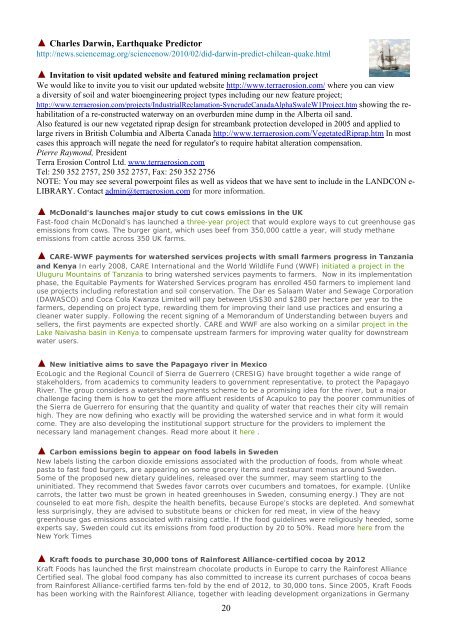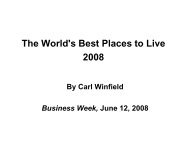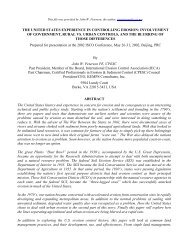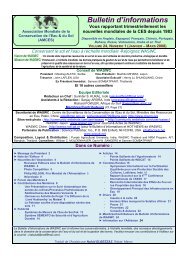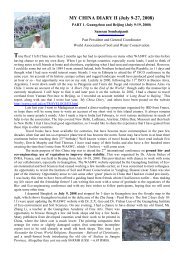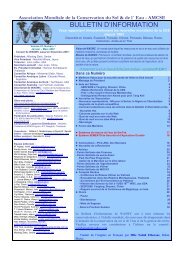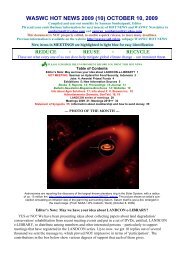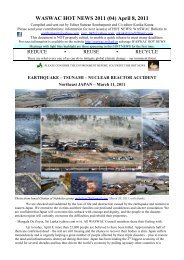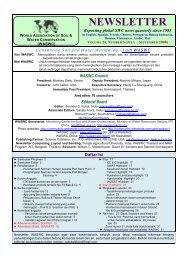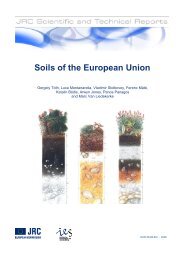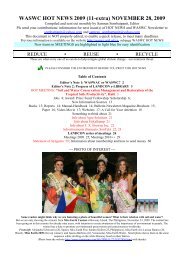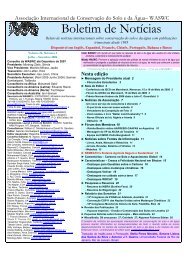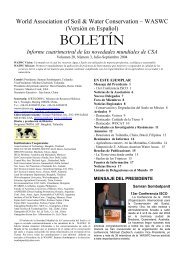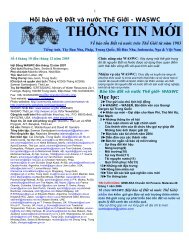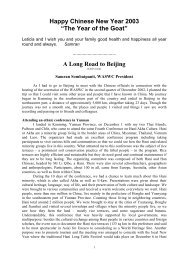▲ Charles Darwin, Earthquake Predictorhttp://news.sciencemag.org/sciencenow/<strong>2010</strong>/02/did-darwin-predict-chilean-quake.html▲ Invitation to visit updated website <strong>and</strong> featured mining reclamation projectWe would like to invite you to visit our updated website http://www.terraerosion.com/ where you can viewa diversity <strong>of</strong> soil <strong>and</strong> water bioengineering project types including our new feature project;http://www.terraerosion.com/projects/IndustrialReclamation-SyncrudeCanadaAlphaSwaleW1Project.htm showing the rehabilitation<strong>of</strong> a re-constructed waterway on an overburden mine dump in the Alberta oil s<strong>and</strong>.Also featured is our new vegetated riprap design for streambank protection developed in 2005 <strong>and</strong> applied tolarge rivers in British Columbia <strong>and</strong> Alberta Canada http://www.terraerosion.com/VegetatedRiprap.htm In mostcases this approach will negate the need for regulator's to require habitat alteration compensation.Pierre Raymond, PresidentTerra Erosion Control Ltd. www.terraerosion.comTel: 250 352 2757, 250 352 2757, Fax: 250 352 2756NOTE: You may see several powerpoint files as well as videos that we have sent to include in the LANDCON e-LIBRARY. Contact admin@terraerosion.com for more information.▲ McDonald's launches major study to cut cows emissions in the UKFast-food chain McDonald’s has launched a three-year project that would explore ways to cut greenhouse gasemissions from cows. The burger giant, which uses beef from 350,000 cattle a year, will study methaneemissions from cattle across 350 UK farms.▲ CARE-WWF payments for watershed services projects with small farmers progress in Tanzania<strong>and</strong> Kenya In early 2008, CARE International <strong>and</strong> the <strong>World</strong> Wildlife Fund (WWF) initiated a project in theUluguru Mountains <strong>of</strong> Tanzania to bring watershed services payments to farmers. Now in its implementationphase, the Equitable Payments for <strong>Water</strong>shed Services program has enrolled 450 farmers to implement l<strong>and</strong>use projects including reforestation <strong>and</strong> soil conservation. The Dar es Salaam <strong>Water</strong> <strong>and</strong> Sewage Corporation(DAWASCO) <strong>and</strong> Coca Cola Kwanza Limited will pay between US$<strong>30</strong> <strong>and</strong> $280 per hectare per year to thefarmers, depending on project type, rewarding them for improving their l<strong>and</strong> use practices <strong>and</strong> ensuring acleaner water supply. Following the recent signing <strong>of</strong> a Memor<strong>and</strong>um <strong>of</strong> Underst<strong>and</strong>ing between buyers <strong>and</strong>sellers, the first payments are expected shortly. CARE <strong>and</strong> WWF are also working on a similar project in theLake Naivasha basin in Kenya to compensate upstream farmers for improving water quality for downstreamwater users.▲ New initiative aims to save the Papagayo river in MexicoEcoLogic <strong>and</strong> the Regional Council <strong>of</strong> Sierra de Guerrero (CRESIG) have brought together a wide range <strong>of</strong>stakeholders, from academics to community leaders to government representative, to protect the PapagayoRiver. The group considers a watershed payments scheme to be a promising idea for the river, but a majorchallenge facing them is how to get the more affluent residents <strong>of</strong> Acapulco to pay the poorer communities <strong>of</strong>the Sierra de Guerrero for ensuring that the quantity <strong>and</strong> quality <strong>of</strong> water that reaches their city will remainhigh. They are now defining who exactly will be providing the watershed service <strong>and</strong> in what form it wouldcome. They are also developing the institutional support structure for the providers to implement thenecessary l<strong>and</strong> management changes. Read more about it here .▲ Carbon emissions begin to appear on food labels in SwedenNew labels listing the carbon dioxide emissions associated with the production <strong>of</strong> foods, from whole wheatpasta to fast food burgers, are appearing on some grocery items <strong>and</strong> restaurant menus around Sweden.Some <strong>of</strong> the proposed new dietary guidelines, released over the summer, may seem startling to theuninitiated. They recommend that Swedes favor carrots over cucumbers <strong>and</strong> tomatoes, for example. (Unlikecarrots, the latter two must be grown in heated greenhouses in Sweden, consuming energy.) They are notcounseled to eat more fish, despite the health benefits, because Europe’s stocks are depleted. And somewhatless surprisingly, they are advised to substitute beans or chicken for red meat, in view <strong>of</strong> the heavygreenhouse gas emissions associated with raising cattle. If the food guidelines were religiously heeded, someexperts say, Sweden could cut its emissions from food production by 20 to 50%. Read more here from theNew York Times▲ Kraft foods to purchase <strong>30</strong>,000 tons <strong>of</strong> Rainforest Alliance-certified cocoa by 2012Kraft Foods has launched the first mainstream chocolate products in Europe to carry the Rainforest AllianceCertified seal. The global food company has also committed to increase its current purchases <strong>of</strong> cocoa beansfrom Rainforest Alliance-certified farms ten-fold by the end <strong>of</strong> 2012, to <strong>30</strong>,000 tons. Since 2005, Kraft Foodshas been working with the Rainforest Alliance, together with leading development organizations in Germany20
<strong>and</strong> the U.S. - Deutsche Gesellschaft fur Technische Zusammenarbeit (GTZ) <strong>and</strong> the United States Agencyfor International Development (USAID) - as well as with cocoa trader, Armajaro, to support sustainable cocoaproduction in Cote d’Ivoire, West Africa. This project, the “Market-Oriented Promotion <strong>of</strong> Sustainable CertifiedCocoa Production” project, has enabled six Ivorian cooperatives, representing over 2,000 farmers in theDaloa/Issia <strong>and</strong> Abengourou areas, to earn the Rainforest Alliance-certified seal. As a result, the last cropyear improved yields <strong>and</strong> made significant productivity gains, in some cases above 50%, according to theproject. The incidence <strong>of</strong> cocoa ‘black pod’ disease was also reduced by one third <strong>and</strong> farmer incomes haveimproved. Read more here from Environmental Leader.▲ Certified sustainable palm oil trade exceeds 250,000 tonsMore than 250,000 tons (metric tons) <strong>of</strong> certified sustainable palm oil have been purchased since it becameavailable late last year, indicating the emergence <strong>of</strong> a market for sustainable palm oil. From September toNovember alone, more than 100,000 tons <strong>of</strong> palm oil or corresponding certificates were acquired bycompanies globally. The rise in sales <strong>of</strong> sustainable palm oil coincides with a growing number <strong>of</strong> companiespublicly pledging to fully switch to sustainable palm oil within a certain time frame - most by 2015 - as allRSPO members are required to do. Read more here from Environmental Leader.▲ Farmers are granted <strong>of</strong>ficial status within the UNFCCCThe UNFCCC granted the request from the International Federation <strong>of</strong> Agricultural Producers (IFAP) forFarmers, as an organized group, for <strong>of</strong>ficial status within the Convention. Subject to a 1 1/2 year trial period,the status includes privileges such as a dedicated Farmers <strong>of</strong>fice at UNFCCC meetings, access <strong>and</strong> speakingslots in restricted plenary sessions. This recognition indicates that the UNFCCC secretariat believes thatfarmers <strong>and</strong> agriculture will be play a significant role in the Convention in the future. IFAP has been a veryeffective advocate for the agriculture <strong>and</strong> farmers agendas under the UNFCCC.▲ FAO launches report on food security <strong>and</strong> climate change in developing countriesDuring the UNFCCC Barcelona Climate Change Talks in November, the Food <strong>and</strong> Agriculture Organization <strong>of</strong>the United Nations (FAO) launched a report, Food Security <strong>and</strong> Agricultural Mitigation in DevelopingCountries: Options for Capturing Synergies , that argues that the twin battles to improve food security for agrowing world population <strong>and</strong> contain climate change can be fought on the same front – the world’sfarml<strong>and</strong>. According to FAO, agriculture not only suffers the impacts <strong>of</strong> climate change, it is also responsiblefor 14% <strong>of</strong> global greenhouse gas emissions. But agriculture has the potential to be an important part <strong>of</strong> thesolution, through mitigation – reducing <strong>and</strong>/or removing – a significant amount <strong>of</strong> global emissions, FAOsays. Some 70% <strong>of</strong> this mitigation potential could be realized in developing countries.▲ FAO reports examine the potential <strong>of</strong> organic agriculture <strong>and</strong> grassl<strong>and</strong>s to mitigate climatechange The UN Food <strong>and</strong> Agriculture Organization (FAO) has released reports examining the potential fororganic agriculture <strong>and</strong> sustainable management <strong>of</strong> grassl<strong>and</strong>s to mitigate climate change. The report onorganic agriculture, Organic Agriculture <strong>and</strong> Carbon Sequestration: Possibilities <strong>and</strong> constraints for theconsideration <strong>of</strong> organic agriculture within carbon accounting systems, discusses the ways in which organicsystems can meet carbon accounting requirements, including permanence, leakage <strong>and</strong> additionality, <strong>and</strong>how organic agriculture might be treated under existing carbon accounting st<strong>and</strong>ards. The report advocatesfor the development <strong>of</strong> guidelines for measurement <strong>and</strong> verification strategies suitable for organic agriculture<strong>and</strong> the development <strong>of</strong> pilot programs.The second paper, Review <strong>of</strong> Evidence on Dryl<strong>and</strong>s Pastoral Systems <strong>and</strong> Climate Change, explains thatgrassl<strong>and</strong>s have vast untapped potential to mitigate climate change by absorbing <strong>and</strong> storing CO2, <strong>and</strong> thatthis could be greater than forests if properly managed. Covering some <strong>30</strong>% <strong>of</strong> the earth’s ice-free l<strong>and</strong>surface <strong>and</strong> accounting for 70% <strong>of</strong> its agricultural l<strong>and</strong>, the world’s 3.4 billion ha <strong>of</strong> grassl<strong>and</strong>s can also play amajor role in supporting the adaptation <strong>and</strong> reducing the vulnerability to climate change <strong>of</strong> over one billionpeople who depend on livestock for a living.▲ Australian scientists researching burp-less livestockAustralian scientists hold out hope that breeding a burp-less sheep can help the country reduce its emissions.About two-thirds <strong>of</strong> Australia’s agricultural greenhouse emissions are produced from the guts <strong>of</strong> grazinglivestock such as sheep <strong>and</strong> cattle. Scientists are testing different strains <strong>of</strong> sheep to find out which belch lessmethane. The Sheep Co-operative Research Centre is conducting a world-first study into about 700 sheepwith 20 different genetic lines – each is fed, then shepherded into a booth where scientists measure theirburp outputs. If a particular gene controls can be found for methane production, breeders may be able toselect sheep that belch less <strong>and</strong> less methane. They also are considering a similar program for cattle. Readmore here from the Herald Sun.▲ <strong>World</strong> Bank publishes note on reduced emissions <strong>and</strong> enhanced adaptation in agriculturall<strong>and</strong>scapes The <strong>World</strong> Bank has published a note emphasizing the role <strong>of</strong> good agricultural practices <strong>and</strong>integrated natural resource management in addressing both mitigation <strong>and</strong> adaptation to climate change inproduction l<strong>and</strong>scapes. The note focuses on the role <strong>of</strong> good agricultural practices in protecting existingstocks <strong>of</strong> soil carbon in cropl<strong>and</strong>s, peatl<strong>and</strong>s <strong>and</strong> wetl<strong>and</strong>s; replenishing soil <strong>and</strong> biomass carbon <strong>and</strong>21


